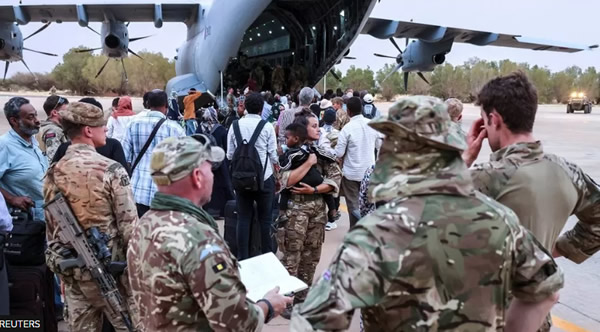
The final UK rescue flights are expected to take off from Sudan on Wednesday, the government has said.
Foreign Secretary James Cleverly said British nationals still wanting to leave the country should go to the Coral Hotel in Port Sudan by 10:00 local time (09:00 BST).
He added that there would be “no further British evacuation flights” from the city.
Some 2,341 people have so far been airlifted to safety on 28 UK flights.
It was previously thought the evacuation had ended on Monday when planes left Sudan for Cyprus.
The UK government has described its evacuation as “the longest and largest operation of any Western nation”.
Those rescued during the airlift include Britons, their dependents, Sudanese NHS staff and other eligible nationalities.
Earlier on Tuesday, Downing Street said 1,195 British nationals had been airlifted out so far.
Last week, a negotiated, short-term ceasefire allowed UK evacuation flights to take off from an airstrip near Khartoum, while the fragile ceasefire held.
On Monday evening, two additional evacuation flights left Port Sudan carrying mainly British nationals.
The most recent two flights brought 144 people to safety.
Speaking earlier in the House of Commons, Africa Minister Andrew Mitchell told MPs the evacuation had “been extremely successful”.
He said the UK was maintaining a diplomatic presence in Port Sudan, as well as at Sudan’s borders with Egypt and Ethiopia.
And the HMS Lancaster ship is off the coast to support Britons.
Efforts are now focused on Port Sudan, “helping British nationals there who are seeking to leave”, Mr Mitchell said.
He went on: “Foreign Office staff who remain are helping British nationals to leave the country, signposting options for departure.
“British nationals in Port Sudan who require support should visit our team without delay.”
He said ending the violence “remains essential”, and said that “aid operations are now at a standstill”.
Previously, BBC Newsnight had reported that 24 NHS doctors had been unable to board evacuation flights to the UK.
MPs were told that the latest figures showed 22 of them had now been evacuated out of the country.
A Sudanese paediatrician whose family’s passports were locked in the British embassy in Khartoum has now been evacuated.
Elham Babikir, who had been offered a job at Telford NHS Trust and granted a visa, was in the final stages of moving to the UK when the fighting broke out. Along with her husband and three young children, she was consequently stranded in Sudan.
After fleeing to the countryside, she eventually travelled to Port Sudan to seek assistance from the British authorities based there. In the last 24 hours she was granted a place on an evacuation flight after an intervention from the NHS.
She said: “The officials there were so nice to us… The NHS helped with our evacuation.”
Speaking earlier on Tuesday to BBC Radio 4’s Today programme, Mr Cleverly said the focus was shifting to providing humanitarian aid, though he warned that relief efforts were likely to be impeded by continuing conflict.
Fighting in the country is in its third week, with thousands of people fleeing since the conflict broke out.
Fighting erupted last month between the Sudanese military and paramilitary group the Rapid Support Forces (RSF) as they wrestled for control of the country – with the capital Khartoum at the centre of the heaviest fighting.
More than 100,000 people have fled the country since fighting broke out on 15 April, the United Nations has said, with a further 334,000 people displaced within Sudan.
Officials are warning of an “all-out catastrophe” if fighting does not end.
Meanwhile, the BBC has announced the launch of an emergency radio service to be broadcast into Sudan.
The pop-up radio service, to be broadcast twice daily for three months on the BBC World Service, will provide “crucial” news and information for people based in the war-torn African nation.
It will include eyewitness accounts and news on diplomatic efforts, the BBC said, and help counter disinformation.
Source: BBC























